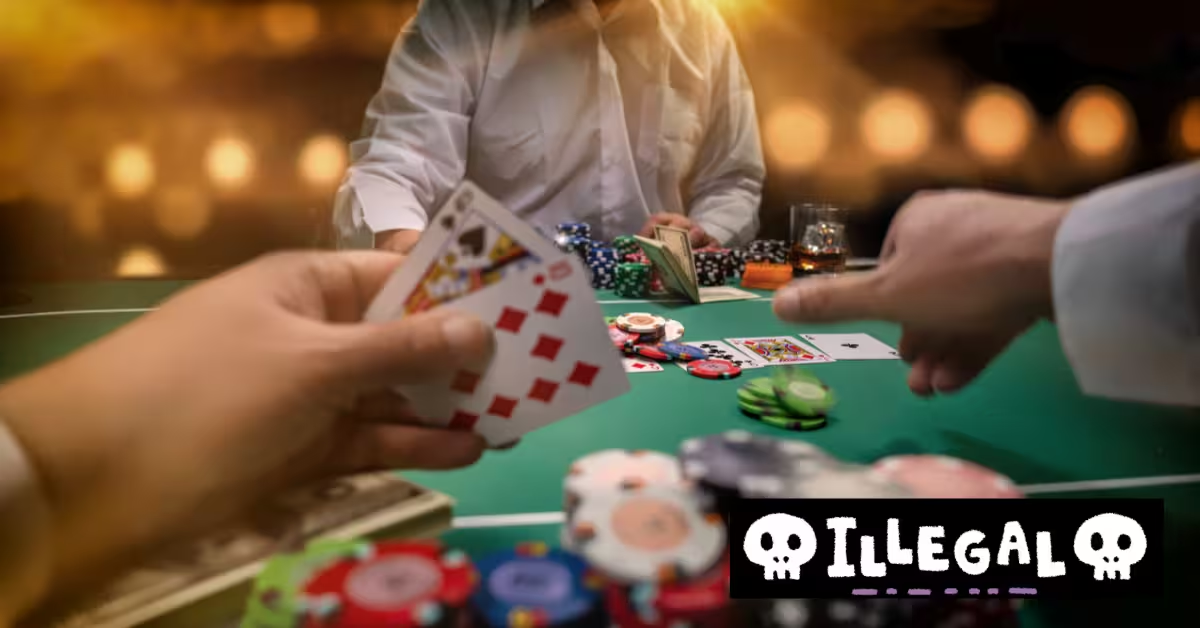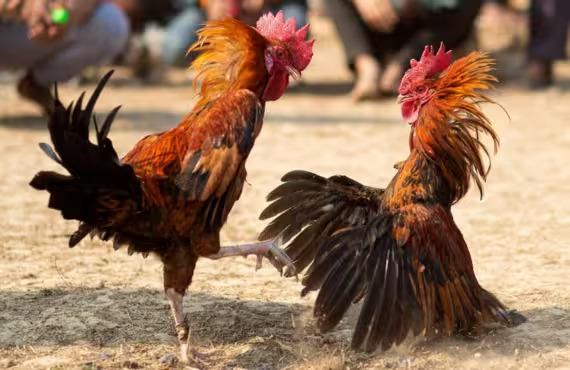Underground Gambling Games From Around the World

If you have ever wanted to know what happens in the seedy underbelly of underground gambling games, hoo boy, we looked into it and have the lowdown.
Not only is it really interesting, but it’s been going on since the inception of gambling around the world.
There are hidden backrooms in Hong Kong where high-rollers play mahjong, and there are lookouts guarding the door. And in Los Angeles? Police have discovered false walls to find a whole illicit casino that’s got all of the games you’d find in a legal casino.
These are just two instances and are part of the global networks of underground gambling, and it’s an entire ecosystem that operates outside the law.
Underground gambling is any wagering activity that is unlicensed, illegal, or otherwise unregulated by official authorities. It could happen in private homes, secret clubs, warehouses, or business premises that are fronts, and they’re all out of reach of casinos and state lotteries.
Why do these covert games keep happening despite the obvious risks of raids or arrest? Part of it is the excitement that comes with danger and getting away with it. People are drawn in by curiosity and the promise of something exclusive; those who partake feel like they’re part of a privileged circle.
We went deep to find the most interesting and audacious underground gambling games around the world, and we are gonna explore their diverse forms, the cultural significance that sustains them, and the thing that keeps players coming back.
We’ll also talk about the very real risks that come with both operating and playing in illicit gambling, so come with us on a global galavant of the hidden side of high-stakes gambling!
The Allure and Nature of Underground Gambling
Even in the era of mega-casinos and legal online betting, underground gambling is alive, well, and doing gangbusters. Why? Because the illegal scene has something the regulated world doesn’t.
Why Go Underground?
Why would you risk it? There are some good reasons, and we get it, but that doesn’t make it less illegal.
Underground games usually don’t impose betting limits or have oversight. This free-for-all atmosphere attracts serious gamblers to wager way above what regulated venues allow. In the U.S., illegal bookmakers and casinos let high-rollers place enormous bets to avoid the betting caps of legal sportsbooks. The American Gaming Association estimates that about $64 billion is bet with illicit bookies annually, partly because bettors and operators want to avoid limits and scrutiny.
There’s something really powerful about being “in on” a secret game. A lot of underground gambling circles function as private clubs where entry is by invitation or reputation only. Molly Bloom, who was the organizer of a notorious Hollywood high-stakes poker ring, said that “Everyone wanted in, [but] few were invited to play,” so exclusivity was a big selling point of her illegal games.
In legal gambling, the house and government always take a cut from casino profits or taxes on winnings. But underground gamblers get to keep every dollar. By operating outside the law, neither the players nor the organizers report the income. This is a huge motive for most operators: organized criminal groups have been known to launder money and evade taxes through illegal gambling ventures. For big winners, the appeal is that their payouts come in unreported cash, untaxed and off the books. Of course, failing to report gambling income is itself illegal, but that risk is all a part of the game.
In some parts of the world, people can’t gamble legally, there are no casinos nearby, or the laws ban almost all forms of wagering. Underground games pop up to meet this pent-up demand. Mainland China is one example: despite strict bans, illegal betting on everything from Mahjong to sports flourishes, with one UK newspaper estimating over ¥1 trillion RMB (about $150 billion) wagered illegally there each year. In places like Thailand or certain Middle Eastern countries, gamblers turn to underground dens because regulated options are nonexistent. The underground literally becomes the only game in town.
Weirdly, a lot of underground gambling operations rely on honor among thieves. Without legal enforcement, these circles are held together by personal trust, word-of-mouth referrals, and sometimes fear. Regular players will vouch for newcomers, and debts are enforced informally, possibly by social pressure or, in harsher circles, by threats from enforcers tied to organized crime. In tight-knit communities, a person’s reputation is their currency: one wouldn’t dare cheat or renege on a debt if they want to stay in the circle.
Characteristics
Underground gambling spans a huge variety of games and cultures, but the illicit operations? They usually share a few traits, like the following:
- Secretive Locations: The games unfold in private spaces that are shielded from public view. It could be a wealthy donor’s penthouse, a shady warehouse on the outskirts of town, a backroom of a barbershop, or a basement beneath a storefront. Raids in Hong Kong have uncovered entire mahjong parlors hidden in nondescript flats retrofitted with soundproofing to muffle the betting noise. In Los Angeles, police have found “casitas” (illegal casinos) tucked behind the façade of ordinary shops; one bust exposed a gambling den operating behind a fake knitting supplies store.
- Varying Levels of Organization: Some underground games are as casual as a weekly poker night among friends (technically illegal in some places if money changes hands, but low risk). Others are sophisticated, full-scale operations. In major cities, you can find well-furnished secret casinos with professional dealers and surveillance cameras watching the doors.
- Cash and Credit Economy: In illicit environments, cash is king. Transactions are always in physical currency to avoid any traceable records. Wads of bills on the table are a common sight. Sometimes a house “banker” holds the cash and issues chips, but any regulated authority doesn’t back those chips; they’re just placeholders for cash. In trusted circles, informal credit may flow as well: gamblers can bet on the tab and settle up later (though falling into debt in an illegal game is extremely dangerous). No one is reporting these transactions to banks or tax agencies. The result is an all-cash underworld economy, which unfortunately also makes these games magnets for robbery (thieves know a room full of illegal gamblers is unlikely to call the cops to report a stick-up).
- House Rules and Ad-hoc Enforcement: Because they operate outside any legal framework, underground games make their own rules. The “house” (whoever runs the game) will take a cut of each pot (a rake) or charge a fee for entry. Cheating is policed not by regulators but by the players or organizers themselves. Remarkably, most illicit games are run fairly because the hosts want return business, but if things go wrong, the only “customer service” department is not gonna be helpful.
Global Glances: Games from the Shadows
All cultures have their own way of gambling, and their own way of doing it under the radar. Next up, we hit Asia, Europe, and the Americas to look at some of the underground games that have taken root!
Asia: Where Tradition Meets High Rollers
Asia has a really complex relationship with gambling. In a lot of Asian societies, betting on games has been part of the culture for centuries, but modern laws often impose strict bans. This tension between tradition and regulation means underground gambling is especially prevalent.
Countries like China outlaw virtually all forms of gambling (except state lotteries), but that hasn’t eradicated the practice; it’s just pushed it into hidden rooms and remote villages. In 2010, The Daily Telegraph reported that Chinese citizens were wagering an estimated ¥1 trillion yuan (roughly $150 billion USD) per year through illegal gambling avenues.
Japan also has heavy restrictions (with only a few exceptions like pachinko or government-approved sports betting), so illegal casinos and high-stakes Mahjong parlors fill the void, and they’re under the control of yakuza syndicates. Across much of Asia, participating in an underground game can carry severe penalties if caught, from steep fines and canings in places like Singapore to lengthy prison terms in China.
Notable Underground Games in Asia

- Mahjong (China and Southeast Asia): Mahjong is a game and a social institution. Legal-friendly games happen everywhere in Asia, but when serious money is on the line, they go underground. In mainland China, clandestine Mahjong dens operate in apartments and teahouses, drawing players who stake significant sums on this tile-based game of skill and luck. Hong Kong and Taiwan have similar scenes when betting limits at legal venues don’t satisfy high rollers.
- Fan-Tan (China): Fan-Tan is an old gambling game that dates back over a thousand years, played with handfuls of beans or coins. In the game’s heyday in the 19th century, it was hugely popular in southern China and among Chinese immigrant communities abroad, despite crackdowns. Fan-Tan has a notable underground history: during the late 1800s in the United States, police routinely raided fan-tan parlors in Chinatowns from San Francisco to New York. The game involves players betting on what remainder will be left when a pile of objects is divided by four, and it was simple to set up in any back room.
- Pai Gow (China): Pai Gow, traditionally played with Chinese dominoes, is another game with deep roots. The casino version (Pai Gow Poker) is well known globally, but in China, classic domino Pai Gow continues quietly in underground circles. Because it’s a slower, highly strategic gambling game, Pai Gow tends to attract older, more experienced bettors. Illegal Pai Gow gatherings might convene in the back of small Mahjong clubs or in private homes. In places like Hong Kong or Macau (where casinos offer a legal version), underground Pai Gow games thrive among those who prefer a more private setting or higher stakes than the casinos allow.
- Underground Poker (Various Asian Countries): Poker, especially Texas Hold’em and Omaha, has exploded in popularity worldwide, and Asia is no exception. But in places like China, Thailand, or Japan, where casino card games are illegal or tightly controlled, poker runs afoul of the law. All across Asia, you’ll find clandestine high-stakes poker games. Some are relatively benign home games among expatriates or business elites, but others are serious operations linked to organized crime.
Element of Risk
It bears repeating that underground gambling in Asia comes with heightened peril, and most Asian governments impose draconian punishments on illegal gamblers to dissuade activity. In mainland China, someone running a casino can face years in prison or worse. In tightly controlled Singapore, even being caught at a single illegal mahjong game could mean a court date, and caning is a possible punishment for organizers. Despite all that, the cultural allure keeps drawing people in.
Gambling has a saying in Chinese: “赌不进三代” (dǔ bú jìn sān dài), meaning “gambling does not pass three generations,” which is a warning that it ruins families.
Europe: Old World Charm, New Age Risks
Heading to Europe, where the gambling history is long and storied. From the decadent card rooms of 18th-century France to the Monte Carlo casinos of the 19th century, a lot of classic games were born or refined here. This legacy means that Europe also has a legacy of illegal gambling whenever the legal avenues were cut off.
After the French Revolution, gambling was outlawed as a corrupt aristocratic vice, but that didn’t kill baccarat. The elite simply just loved their baccarat chemin de fer games in secret salons, continuing to deal cards under the risk of imprisonment. Over the centuries, European countries developed divergent gambling laws. Some, like the UK, eventually legalized and regulated casinos and betting shops; others, like Norway or Poland, heavily restricted them.
Today, Europe still sees illicit gambling in various forms, from unlicensed poker clubs in London to backroom roulette in Paris. Organized crime has a hand in some of it (the Italian Mafia, for example, has a known foothold in illegal betting operations), but European underground games revolve around social circles rather than overt criminal enterprises.
Notable Underground Games in Europe

- Chemin de Fer (France & Italy): This classic version of baccarat was once the game of choice for Europe’s aristocracy, and it endures in exclusive circles. Chemin de fer, meaning “railway” (a nod to its fast pace in the 19th century), allows players to take turns as the banker. While you can find it legally in a few upscale European casinos, many aficionados prefer private play. In France, where gambling for money outside licensed casinos is technically illegal except in homes among friends, wealthy enthusiasts host clandestine chemin de fer nights that echo the elegance of a bygone era. These events are usually by invitation only, often organized under the guise of a “gentlemen’s club” or cultural society to avoid scrutiny. Still, hosts must be careful: French authorities do monitor for illegal gaming, and a high-profile bust of a Parisian baccarat salon in the 2010s reminded people that even VIPs aren’t above the law if they run afoul of the Gaming Act (in one case, organizers were caught because they charged a percentage of bets, violating the exemption for private games).
- La Boule (France): Boule is a lesser-known French gambling game that’s similar to roulette, and it has long lived in informal settings. In the late 19th century, a game called Petits Chevaux (“little horses”) was popular in French casinos. Boule evolved from that, using a small roulette-like wheel with just 9 numbers. Today, Boule is played for low stakes in some corners of France, usually in places without full casinos. Because it’s seen as a quaint pastime, authorities historically turned a blind eye to small Boule games, but technically, it is gambling, and outside authorized venues, it’s not legal.
- Private Poker Clubs (UK & Eastern Europe): Poker’s boom has left virtually no country untouched, and Europe has legal poker venues. But the U.K. and some European regions also have an active underground poker scene, largely due to regulations on stakes and licensing. In Britain, playing poker for money outside a licensed premise is illegal unless it’s a genuine social game in a private home. This hasn’t stopped entrepreneurs from trying to run “card clubs” that operate in a gray area. They’re run in the back room of a pub or in a rented flat with tables and chips, advertised via word-of-mouth or internet forums, and catering to semi-pro players who want higher stakes or tournament formats not found in legal cardrooms.
In Eastern Europe, underground poker has another dimension: in some countries during the 2000s, governments outlawed poker clubs or heavily restricted them (for example, Poland and Russia have oscillated on poker’s legality). This drove the games literally underground into basements.
Some underground poker events in Europe are relatively benign charity or club games that could be legal if licensed, but the organizers don’t bother with formalities. As long as the buy-ins and prizes stay under certain thresholds and the host doesn’t profit, authorities will turn a blind eye, viewing it as exempt from “private gaming.” But cross that line by taking a rake or advertising the game? And the club can be raided.
The Americas: Speakeasies and Hidden Tables
In the Americas, underground gambling has flourished whenever and wherever legal gambling was constrained. During the United States’ Prohibition era in the 1920s, speakeasies (illegal bars) doubled as gambling joints with card games and dice in the back room.
Organized crime families like the American Mafia famously ran illicit casinos before Las Vegas emerged and even after, skimming profits from both illegal and legal venues. Latin America has its own deep traditions, like cockfighting rings and unlicensed lotteries that have existed for centuries in various countries.
Now, the legal landscape in the Americas is wonky. Some U.S. states have casinos and poker rooms; others ban them, driving gamblers to underground options. Most Latin American countries allow certain gambling (like government-run lotteries or licensed casinos in tourist areas), but still battle unregulated games in rural areas and city outskirts.
Notable Underground Games in the Americas
- “Casitas” – Hidden Casinos (United States, especially California): In Southern California, law enforcement has been confronted with a proliferation of illegal mini-casinos nicknamed “casitas,” Spanish for “little houses.” These are basically modern-day speakeasies devoted to gambling. A casita might be set up in a residential garage, a warehouse, or behind a legitimate front business. Inside, they feature rows of electronic gambling machines, like video slots and poker machines rigged for cash payouts, as well as table games like blackjack or poker.
Law Enforcement Challenges
The law enforcement challenges are immense. Casitas are fleeting; if one location gets too hot, the operators shut it down and it pops up elsewhere. They also breed associated crime: drug dealing, weapons stashes, and violence. The Los Angeles Sheriff’s Department noted that Mexican Mafia bosses have “little tolerance for anyone who disrupts their rackets;” thieves or cheaters at casitas have been beaten or killed as punishment.
These places can be dangerous not just for operators but for players too, who are at risk of armed robberies (robbers know victims won’t call the police). Despite frequent raids (with dozens of machines and thousands in cash seized ), the casitas keep coming back, driven by community demand and gang backing.

- Underground Poker (United States – High-Stakes Home Games): America loves poker, and since the “poker boom” of the early 2000s, the game has thrived in casinos and legally online in some states. But there’s a parallel world of off-the-books poker games, especially in major cities. These range from relatively innocent “home games” among friends (usually ignored by law enforcement) to full-fledged illegal poker clubs raking in big money.
- Street Dice (Craps in Urban Centers): A quintessential form of underground gambling in America is the sidewalk craps game. This is the archetype seen in movies and music videos: a group of people gathered in an alley or on a street corner, rolling dice against a wall, cash in hand. These impromptu dice games (usually called “shooting dice” or “street craps”) happen in most U.S. cities, particularly in working-class urban neighborhoods. They are usually small stakes; bets of $5, $20, maybe $100; and are as much about camaraderie and excitement as making money. Street craps have few barriers to entry: you just need a pair of dice and a sidewalk.
- Animal Fights (Cockfighting and Dogfighting in the U.S. and Latin America): One of the darkest corners of underground gambling involves animal fighting rings. Cockfighting (roosters) and dogfighting are illegal throughout the U.S. and in many countries due to the extreme cruelty to animals, but these blood sports persist, driven largely by gambling. Participants wager on the outcomes of fights: which rooster will be the last standing, which pit bull will survive the match. It’s important to stress the ethical condemnation these activities rightfully receive; they are horrific for the animals and punishable by law (often as felonies now). However, they remain a reality in parts of Latin America, Southeast Asia, and pockets of the United States (especially the rural South or in clandestine urban circles).
Law Enforcement
Across the Americas, one theme is clear: authorities are constantly trying to catch up with illegal gambling operators. Whether it’s vice squads raiding a weekly poker game in New York, county sheriffs dismantling a casita in California, or federal agents indicting a multi-state bookmaking ring, the effort is continuous. But the very nature of underground gambling (fluid, adaptive, and fueled by demand) means that as soon as one operation falls, another often starts up.
In the U.S., the legal landscape is becoming more permissive with many states legalizing sports betting and card rooms, which, ironically, may undercut some black-market gambling. But hardcore underground games will likely remain, either to avoid taxes, avoid limits, or simply because they offer something illicit that people crave. Latin American countries similarly oscillate between liberalizing gambling (to draw tourism and revenue) and cracking down (to control social ills), and in that oscillation, illegal games find their window.
The Human Element: Why the Underground Endures
Now, let’s take a gander at the human psychology and social factors that keep the underground gambling world alive. Gambling is as much about people, their desires, fears, and motivations, as it is about cards or dice. Why do individuals gravitate toward illicit gaming when safer, legal options exist? What emotional or cultural needs does the underground fulfill?
There’s a rush that comes from doing something illicit. Psychologists recognize that gambling already triggers reward circuits in the brain (the dopamine hit of risk and reward), and doing so in a high-risk illegal context can amplify that effect.
Underground gamblers will tell you that the possibility of a police raid or the clandestine nature of the venue actually heightens their excitement. It’s an adrenaline double-whammy: the uncertainty of the game’s outcome coupled with the knowledge that you’re breaking the rules.
Even though legal casinos are open in certain regions, some gamblers stick with their underground circles because a clean, regulated environment feels too tame. A sense of rebellion and sticking it to the authorities can be a psychological draw in places or times where personal freedoms are otherwise limited.
Human beings are social creatures, and gambling, legal or not, is a social activity. Underground gambling can forge tight-knit communities. Regular players at an illegal game will see each other weekly, form friendships, rivalries, and mutual respect. There’s a camaraderie in being part of an open secret together.
For high-stakes underground poker? Part of its cachet is knowing you’re playing where few others could get in. We saw this with Molly Bloom’s celebrity games, as being invited to those was a status symbol in itself.
From a more practical perspective, players believe they can get a better deal in underground games. Illegal operators don’t pay for licenses, expensive overhead, or taxes, so they can (in theory) offer more favorable odds or higher payouts. Sports bettors sometimes prefer illegal bookies because they might extend credit and not report winnings.
Casino game enthusiasts might like that an underground game has no house edge beyond a small cut, whereas a legal casino game has stricter rules that favor the house. While these perceived advantages sometimes backfire (since nothing stops an illegal operator from cheating or withholding payouts), a lot of gamblers are enticed by the chance to keep more of their winnings.
Also, underground games frequently allow credit betting, which is a dangerous feature, but it’s one that appeals to those chasing losses. In a legal casino, you have to front your cash or get markers backed by proof of funds. In an illegal game, you might be able to bet on IOU if you’re a trusted regular. That can lead to bigger bets (and unfortunately, bigger losses).
And no taxes or casino commissions means if you do hit a big win, you walk away with everything (provided that the house pays up). The prospect of an untaxed windfall keeps some players in the underground scene. It’s worth noting, though, under U.S. law, even illegal gambling winnings are taxable income (if one were inclined to report them). But culturally, people think of illegal wins as “free money.” So the greed factor certainly plays a role here.
For some, underground gambling isn’t a choice; it’s ingrained in their way of life or heritage. This is evident in games like cockfighting or mahjong. In certain rural communities, cockfights have been a weekend tradition for generations, with fathers teaching sons how to pit roosters and neighbors gathering in a ritualized event.
When these are outlawed, participants feel a sense of cultural preservation in keeping them going covertly. It’s a way of saying: “This is our tradition, government aside.” Similarly, in Chinese communities, playing mahjong for stakes during New Year’s or family gatherings is extremely common and seen as part of the festive culture. If local laws forbid gambling, many will still play among family or close friends for money, rationalizing it as culturally appropriate. The emotional pull of tradition simply does not outweigh the abstract notion of legality.
And gambling can offer people hope or escape, which draws them to illegal games if they have limited options. A poor worker in a country with few legal outlets could see an underground lottery or numbers game as their shot at changing their fate.
This was historically true in places like the U.S. in the early 20th century; the illegal “numbers” lottery thrived in Black communities, run by racketeers, because it was one of the few ways for residents to dream of a windfall (the state lotteries and legal betting were not accessible to them). The same dynamic exists today: illegal lotteries or betting pools still pop up in impoverished areas globally, feeding on people’s hopes and dreams as much as their greed. The clandestine nature can add to the allure: it feels subversive, like it’s a small act of autonomy for someone who feels controlled in every other aspect of life.
The Dark Side: Risks and Realities
We can romanticize underground gambling all we want, but the glamour fades when compared to a long list of very real dangers and costs. Unlike regulated gambling, where some safeguards exist, the illicit scene is a place where anything goes. There are legal consequences that can upend lives, security risks that come with trusting criminals, the potential for gambling addiction to spiral unchecked, and the involvement of organized crime can turn games into sinister things.
Legality
The most obvious risk of underground gambling? Getting caught. Laws vary, but virtually every jurisdiction punishes illegal gambling in some form. Penalties can range from fines and confiscation of money/equipment to imprisonment. If you’re a player, you might get off with a misdemeanor charge or fine in many places (some U.S. states, for instance, penalize the organizer more heavily than the participant).
But in strict environments, both organizers and bettors face serious jeopardy. Singapore is a case in point: merely being present in a “common gaming house” (illegal gambling establishment) can bring a $5,000 fine and 6 months in jail, while running one can mean up to 3 years’ imprisonment. Many Asian and Middle Eastern countries have similarly harsh laws; in some cases, caning or corporal punishment has been used for gambling offenses.
And in the more lenient Western countries, getting nabbed in a gambling raid can lead to a criminal record, which has knock-on effects (employment issues, social stigma). In the U.S., federal charges can apply if gambling is tied to other crimes (like RICO charges when organized crime is involved). That can escalate a simple poker game into a multi-year prison sentence scenario. And if you think being just a player will spare you, note that in Canada, being “found in” an illegal gaming house is explicitly a crime punishable by up to 6 months in jail.
Legal troubles can also compound: authorities can seize assets (cash, cars, homes) if they suspect they were used in or gained from illegal gambling, under forfeiture laws. So, one night of fun could, in the worst case, lead to losing your bankroll, your freedom, or both.
Security
In a regulated casino, you don’t have to worry that the dealer is going to pull a gun on you or that you’ll get knifed for winning a big hand. In the underground, those aren’t impossible scenarios. No consumer protection exists.
If the game is crooked? You have zero recourse. If you’re robbed? You can’t exactly file a police report saying you lost illegal funds, and underground gamblers have learned this the hard way. Armed robberies of illegal games are alarmingly common; criminals target them precisely because they expect victims to keep their mouths shut.
The FBI says that hosts of underground poker games fear armed robbery more than legal action, and there have been incidents where gangs specifically invaded high-stakes home games or backroom casinos, sometimes in collusion with an inside man, and relieved everyone of their cash and valuables at gunpoint.
Players have been tied up, beaten, or worse in such heists, and reporting it is problematic (“Dear Police, I was in an illegal casino when I got robbed…”). Even without outside criminals, the environment can get violent. If a dispute arises, like someone suspects someone else of cheating, or a debtor can’t pay up, it might be settled through intimidation or assault. Most illegal gambling dens employ muscle (literal or implied) to keep order. In triad-run mahjong houses, it’s understood that causing trouble could get you hurt by gang enforcers. In mob-run poker games, if you don’t pay your losses, you might get a late-night “visit.”
Moreover, illegal venues can pose general safety hazards; they can be in cramped, poorly ventilated spaces. There’s also the risk of being in the wrong place during a raid: some law enforcement raids on gambling dens involve SWAT-style entries due to concerns about armed resistance. Innocent bystanders (well, as innocent as an illegal gambler can be) could get injured if things go south.
But in legal casinos that have surveillance, professional security staff, and strict protocols, you are most definitely safer, at least physically. In the underground, you rely on whoever is running the show for your safety, and their priority is usually not your well-being. So when you walk into an illegal gambling situation, you are on your own. The usual social contracts are loosened, and, as the adage goes, anything can happen, and it’s not always for the better.
Addiction
Gambling addiction is a serious issue in the best of circumstances, but in underground settings? It can be even more destructive. Legal casinos, for all their faults, at least have some responsible gambling measures (self-exclusion programs, limits, pamphlets about gambling help lines, etc.).
In the underground world, the attitude is generally “the more you lose, the better.” No one is cutting off a problem gambler; in fact, they might be extended credit to keep them playing, sinking them into deeper debt. Loan sharks are circulating in these circles, ready to lend an addicted player money at usurious interest rates (with brutal enforcement if not repaid).
There are countless tales of people losing not just their savings but their homes, their businesses, because illegal gambling debts piled up. Those debts can lead to desperate acts, and some resort to crime to pay off gambling losses (embezzling from employers, theft, etc.), so it fuels further illegality. Without any oversight, minors or vulnerable individuals could also be present in underground games when they absolutely shouldn’t be.
The social stigma and secrecy also mean problem gamblers in these circles are a lot less likely to seek help. They can’t openly say “I lost a fortune at an illegal casino” to family or counselors, so the downward spiral continues in silence.
In China, where legal outlets are few, problem gambling has been noted to be potentially more prevalent precisely because it’s all underground and thus harder to monitor or mitigate. People get in over their heads quickly, and the sense of shame is exacerbated by the fact that they were doing something illegal, so an addict might feel they have nowhere to turn without incriminating themselves.
This can, unfortunately, lead to tragic outcomes like depression or suicide. In the jurisdictions with the harshest anti-gambling laws, you usually see a strong black market in loan sharking and debt collection, a symbiosis that preys on addicts. Organized crime is more than happy to oblige an addicted gambler with more credit, knowing they can extract payment one way or another. This exploitation is a dark underbelly that doesn’t get publicized (because victims are afraid or embarrassed), but it ruins lives. The underground scene offers zero safety nets for those who are susceptible to gambling’s pull. It can intensify addiction by taking away all brakes and safety measures.
Organized Crime
It’s not a secret that illegal gambling is a staple revenue source for organized crime worldwide. Historically, American Mafia families earned millions from underground betting and “numbers” rackets, using that money to finance other ventures (drugs, bribery, etc.). The FBI warns that criminal groups often funnel illegal gambling profits into activities like human trafficking, drug trafficking, and weapons deals. This means that even if you, as an underground gambler, aren’t involved in anything else criminal, your losses might indirectly be funding some very nasty enterprises.
Law enforcement sees illegal gambling not as a victimless crime but as an entry point to tackling larger criminal networks. Recent Europol reports note that in Europe, mafia clans have expanded into online illegal gambling and match-fixing, which are transnational problems. In Asia, Chinese triads and the yakuza have long used gambling dens as a way to launder money and enforce territorial control. The presence of organized crime also raises the stakes for law enforcement response; when gambling is tied to the mafia, investigations will bring in heavy federal charges (e.g., the U.S. RICO statutes) and more aggressive policing.
For the everyday person, rubbing shoulders with organized criminals at a gambling event can be dangerous in itself. You could be a witness to something or get into a dispute unwittingly. There’s also the money laundering in underground gambling: Criminals with lots of dirty cash love illegal casinos because they can mix their illicit money with gambling funds to obscure its origin.
And think about the scenario of a big win; suppose you, a nobody, walk into an illegal betting joint and hit a huge jackpot or beat a mobbed-up player in poker. There is a non-zero chance you won’t be allowed to walk out with that money, and there have been incidents where big winners were strong-armed into “donating” a chunk to the house or robbed after the game by associates of the house. In the underworld, honor among thieves only goes so far.
Illegal gambling hubs often attract other crimes: prostitution, drug sales, loan sharking (as mentioned), and weapons trafficking. A raid on a single casita in California didn’t just net gambling machines; it found drugs and illegal firearms as well. So when you participate, you’re walking into an environment where multiple criminal activities might be in play. This increases the chances of getting swept up in something larger than you bargained for. It’s one thing to be charged with illegal gambling, but you definitely don’t want to be around if a den gets busted and there’s a bunch of cocaine or unregistered guns on the premises, because now you’re in even bigger trouble by association.
Conclusion: A World Less Seen
Underground gambling is a globe-spanning phenomenon, and it’s rich in history and intrigue, but also fraught with peril. We’ve been to the discreet Parisian card rooms, secret Beijing mahjong dens, Los Angeles “casitas,” and illicit cockfighting pits in the backwoods.
Why does it keep happening? Human nature and its many facets: ingenuity, greed, cultural pride, rebellion, camaraderie, and risk-taking.
The world of underground gambling is one that most people will probably never see firsthand, and that might be for the best. But we can’t deny that it’s a testament to the ingenuity and the folly of gamblers who operate outside of the law.
It will likely always be out there in some form, as long as laws and luck coexist. But for those of us on the outside, it’s a world better observed from a safe distance, rather than experienced in person. Because in gambling, playing by the rules might not be as exciting, but it’s a lot less likely to land you in legal trouble or being paid a visit by a debt collector who will make you pay up or break one (or both) of your legs.

Alyssa contributes sportsbook/online casino reviews, but she also stays on top of any industry news, precisely that of the sports betting market. She’s been an avid sports bettor for many years and has experienced success in growing her bankroll by striking when the iron was hot. In particular, she loves betting on football and basketball at the professional and college levels.








